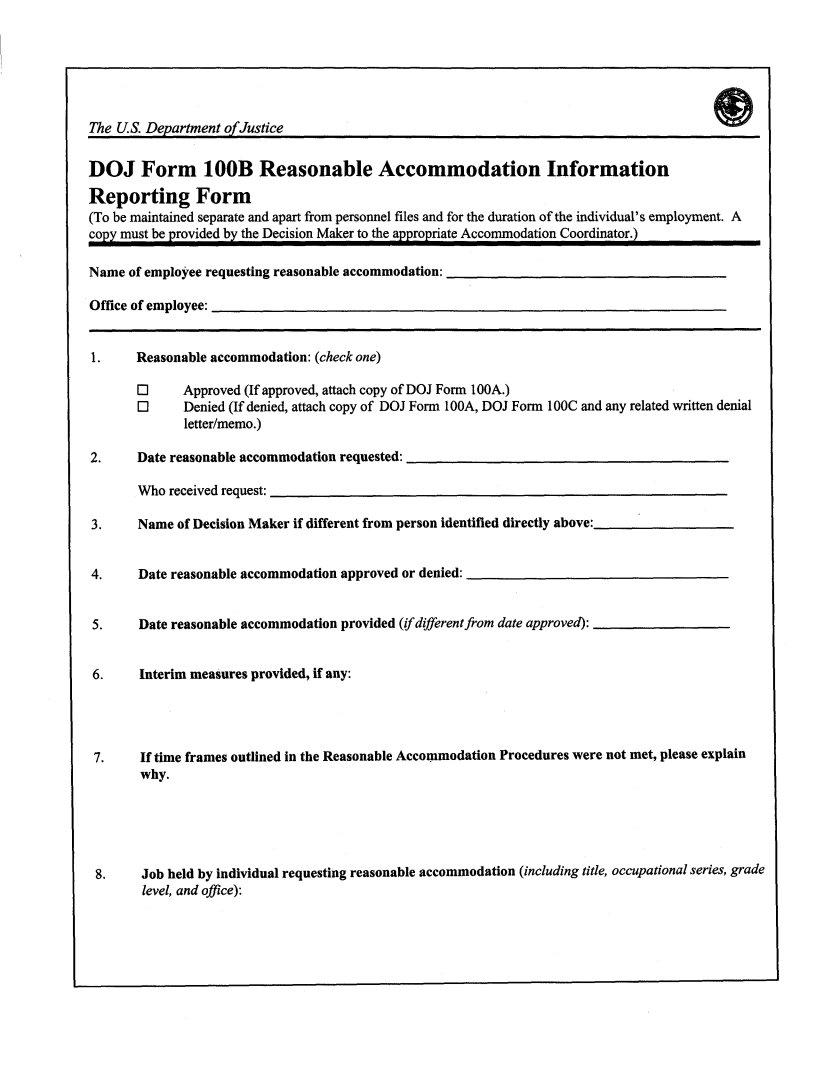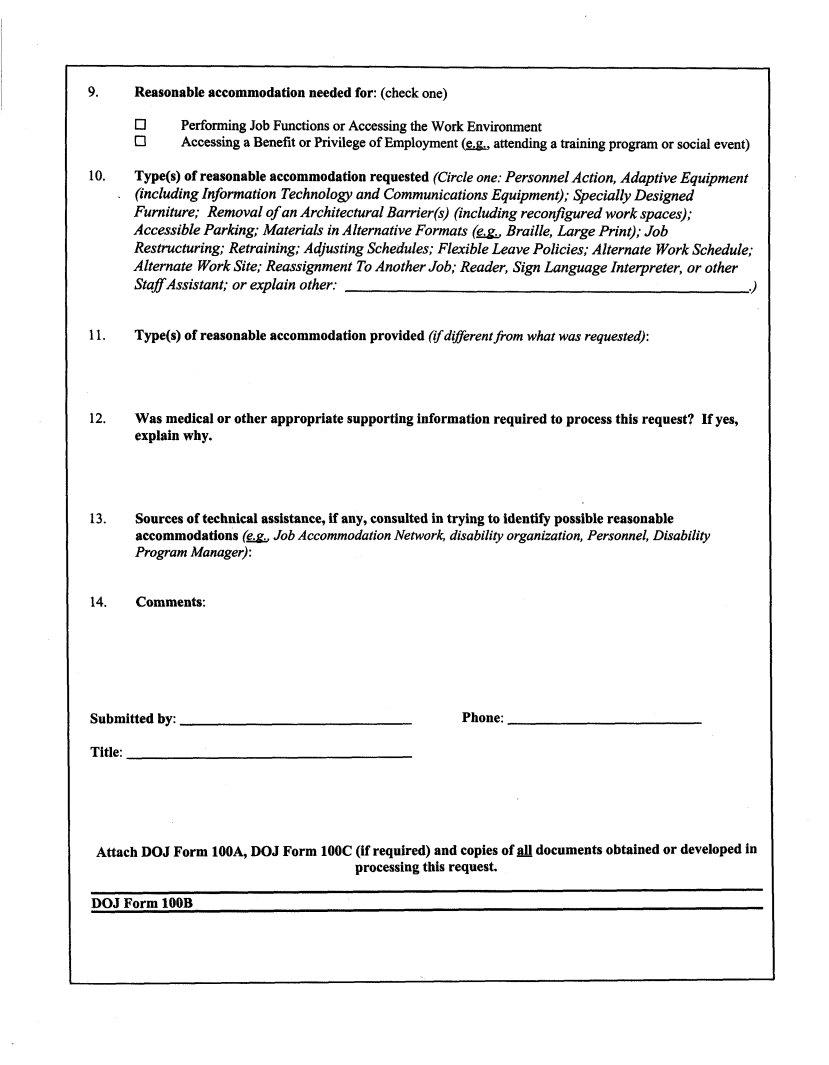The Department of Justice (DOJ) Form 100B, titled "Reasonable Accommodation Information Reporting Form," plays a critical role in documenting and managing requests for reasonable accommodations by individuals with disabilities within the Department. This form ensures a systematic approach to tracking these requests from the initial stage to their final disposition, safeguarding the rights of employees to work in an environment that acknowledges and adjusts for their needs. The form details various aspects of the accommodation request process, including the identification of the employee, the specific accommodation requested, the decision-making process, and the outcome. It also mandates the separation of this sensitive information from regular personnel files, emphasizing confidentiality and privacy. By requiring a thorough documentation process, including the necessity to attach related forms such as the DOJ Form 100A for approved requests or the DOJ Form 100A and DOJ Form 100C for denied ones, the form serves as a comprehensive tool for both accountability and compliance with relevant laws and regulations, including the Rehabilitation Act of 1973, Executive Order 13164, and policies set forth by the Equal Employment Opportunity Commission. Additionally, the form is protected under the Privacy Act of 1974, highlighting its importance in respecting and securely managing personal information related to accommodations within the justice department.
| Question | Answer |
|---|---|
| Form Name | Doj Form 100B |
| Form Length | 3 pages |
| Fillable? | No |
| Fillable fields | 0 |
| Avg. time to fill out | 45 sec |
| Other names | 2000, CommunicationsEquipment, includingtitle, 100ADOJ |

DOJ Form 100BReasonable Accommodation Information Reporting Form
(To be maintained separateand apart from personnel files and for the durationof the individual’semployment. A copy must be provided by the Decision Maker to the appropriateAccommodationCoordinator.)
Name of employee requesting reasonable accommodation:
Office of employee:
1.Reasonable accommodation: (checkone)
Approved (If approved, attach copy of DOJ Form 100A.)
Denied (If denied, attach copy of DOJ Form 100A,DOJ Form 100Cand any related written denial letter/memo.)
2.Date reasonable accommodation requested: Who received request:
3.Name of Decision Maker if different from person identified directly above:
4.Date reasonable accommodation approved or denied:
5.Date reasonable accommodation provided (ifdifferentfrom date approved):
6. Interim measures provided, if any:
7.If time frames outlined in the Reasonable Accommodation Procedures were not met, please explain why.
8.Job held by individual requesting reasonable accommodation (includingtitle, occupational series,grade
level, and office):

9.Reasonable accommodation needed for: (check one)
Performing Job Functions or Accessingthe Work Environment
Accessing a Benefit or Privilege of Employment (eg.,attendingA training program or socialevent)
10.Type(s) of reasonable accommodation requested (Circleone:Personnel Action, AdaptiveEquipment (includingInformation Technology and CommunicationsEquipment); Specially Designed Furniture; Removal OF anArchitecturalBarrier(s)(includingreconfigured work spaces); AccessibleParking; Materials inAlternative Formats (e.g.,Braille,Large Print);Job Restructuring; Retraining;Adjusting Schedules; Flexible Leave Policies;Alternate WorkSchedule; Alternate WorkSite; Reassignment ToAnother Job; Reader, Sign Language Interpreter,or other
StaffAssistant; or explain other: |
.) |
11.Type(s) of reasonable accommodation provided (ifdifferentfrom what was requested):
12.Was medical or other appropriate supporting information required to process this request? If yes, explain why.
13.Sources of technical assistance, if any, consulted in trying to identify possible reasonable accommodations (E.G.,JobAccommodationNetwork, disability organization,Personnel,Disability ProgramManager):
14.Comments:
Submitted by: |
Phone: |
Title:
Attach DOJ Form 100A, DOJ Form 100C(if required) and copiesof alldocuments obtained or developed in
processing this request.
DOJ Form 100B
PRIVACY ACT STATEMENT
(This form is covered by the Privacy Act of 1974. Public Law
1.FORM NUMBER/TITLE/DATE: DOJ Form 100A /Request for Reasonable Accommodation/ October 17, 2002; DOJ Form 100B/Reasonable Accommodation Information Reporting Form/ October 17, 2002; or DOJ Form 100C/Denial of Reasonable Accommodation/October 17, 2002.
2.AUTHORITY: The Rehabilitation Act of 1973, as amended, 29 U.S.C. 791; Executive Order 13164, dated July 26, 2000, Section 1(b)(9); and Equal Employment Opportunity Commission’s Policy Guidance on Executive Order 13164: Establishing Procedures to Facilitate the Provision of Reasonable Accommodation, Directives Transmittal Number 915.003, October 20, 2000.
3.PRINCIPAL PURPOSE: To record and track requests for reasonable accommodation by individuals with disabilities, their provision, and the disposition of such requests for the Department of Justice only.
4.ROUTINE USES: Pursuant to subsection (b)(3) of the Privacy Act, information may be disclosed from
this system as follows: To the news media and the public pursuant to 28 CFR 50.2 unless it is determined that release of the specific information in the context of a particular case would constitute an unwarranted invasion of personal privacy. To a Member of Congress or staff acting upon the Member’s behalf when the Member or staff requests the information on behalf of an individual who is the subject of the record. To the General Services Administration and National Archives and Records Administration in records management inspections conducted under the authority of 44 U.S.C. 2904 and 2906. Where a record, either on its face or in conjunction with other information, indicates a violation or potential violation of law, to any civil or criminal law enforcement authority or other appropriate agency, whether federal, state, local, foreign, or tribal, charged with the responsibility of investigating or prosecuting such a violation or enforcing or implementing a statute, rule, regulation, or order. In an appropriate proceeding before a court, grand jury, or administrative or regulatory body when records are determined by DOJ to be arguably relevant to the proceeding. To an actual or potential party to litigation or the party’s authorized representative for the purpose of negotiation or discussion on such matters as settlement, plea bargaining, or in informal discovery proceedings. To a federal agency or entity that requires information relevant to a decision concerning the hiring, appointment, or retention of an employee, the issuance of a security clearance, the conduct of a security or suitability investigation, or pursuit of other appropriate personnel matter. To a federal, state, local, or tribal agency or entity that requires information relevant to a decision concerning the letting of a license or permit, the issuance of a grant or benefit, or other need for the information in performance of official duties. To contractors, grantees, experts, consultants, students, and others performing or working on a contract, service, grant, cooperative agreement, or other assignment for the Federal Government, when necessary to accomplish an agency function related to this system of records. To a former employee of the Department for purposes of: responding to an official inquiry by a federal, state, or local government entity or professional licensing authority, in accordance with applicable Department regulations; or facilitating communications with a former employee that may be necessary for
5.WHETHER DISCLOSURE IS MANDATORY OR VOLUNTARY AND EFFECT ON INDIVIDUAL FOR NOT PROVIDING INFORMATION: The provision of information for Form 100A is voluntary; however, if you do not provide this information, the Department may not provide you with an accommodation, and you may not receive important information. Forms 100B and 100C are mandatory for Decision Makers.